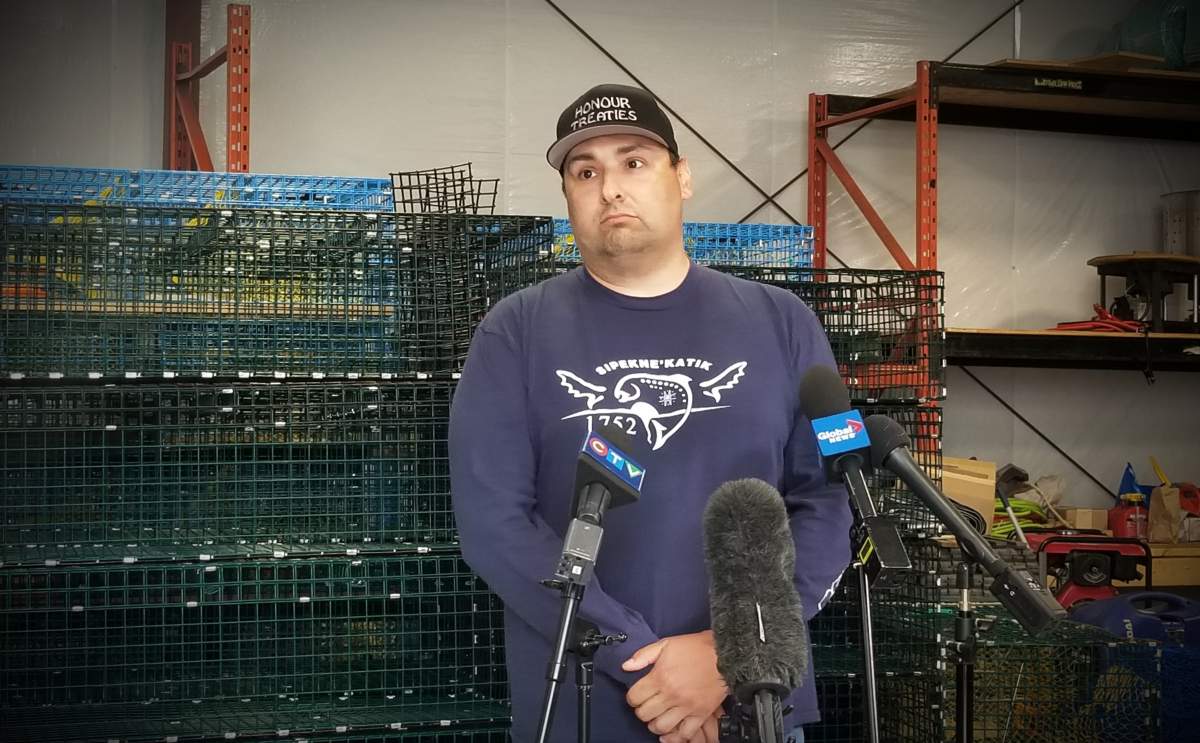About a hundred lobster traps seized by the federal government were returned to Sipekne’katik First Nation on Thursday, as its harvesters prepare for the start of their fishing season next week.

On June 1, Chief Michael Sack says his members will launch their Food, Social and Ceremonial (FSC) Lobster Fishery — a distinct fishery rooted in culture that differs from the moderate livelihood fishery.
Sipekne’katik First Nation Chief Michael Sack speaks with reporters in his community on Thurs. May 27, 2021.”It’s going to be a bit of a slow start,” he told reporters on Thursday. “Our people are a little bit leery and reluctant to go fishing.
“Last year was such a beatdown for our fishers and community. They lost a lot of gear, so we’re encouraging them to get back out there.”
Last September, Sipekne’katik First Nation launched a trailblazing moderate livelihood fishery that sparked wrath, and in some cases, violence from commercial fishers on the southwestern shore.
READ MORE: N.S. Mi’kmaq fisher says his movements are being watched by DFO
The right to fish for a moderate livelihood is affirmed in the 1999 Supreme Court of Canada’s Marshall Decision and recognized by the federal government, which is currently trying to negotiate livelihood fishing plans with more than two dozen First Nations in the region.
Federal conservation officers, however, have continued to seize Mi’kmaw traps that are dropped without departmental authorization. The ones returned to Sipekne’katik on Thursday were taken last fall.
Traps dropped under FSC licenses cannot be seized, said Chief Sack, as the ceremonial fishery is well-established in the courts. It involves fewer licenses than a moderate livelihood fishery, he explained, and its primary purpose is not commercial.
“We’re hoping that’s an easier way forward for our people to fish,” he said.

Get daily National news
READ MORE: Sipekne’katik band councillor, two fishermen to appear in court Monday
Lobster caught as part of the FSC fishery cannot legally be sold, but Chief Sack said the community intends to sell a small portion to help cover their costs. He said he’s confident the community will find enough cash buyers, despite a provincial law preventing the purchase of fish that are not caught and registered under a commercial DFO license,
The launch of the moderate livelihood fishery will come later this summer, he added, with the current delay due to “safety.”

“We haven’t heard anything back from DFO or RCMP if they’re going to protect our people, or continue to leave them in jeopardy and to infringe on their right to fish,” he said.
READ MORE: ‘We absolutely listened’ — Minister backs livelihood fisheries plan as some First Nations oppose it
During a funding announcement on Thursday morning, federal Fisheries Minister Bernadette Jordan called for peace and calm on the waters as First Nations launch moderate livelihood fisheries — with or without federal authorization.
“We don’t want to see people taking the law into their own hands,” said Jordan.
“This should be left up to (Conservation and Protection officers) to ensure everything is done in an orderly fashion, because they are there, like I said, to make sure they are upholding the Fisheries Act.”
READ MORE: Listuguj First Nation signs five-year fisheries agreement with Ottawa
Earlier this year, Jordan invited nations to negotiate short-term fishery plans with her department, which would allow them to fish and sell their catch with DFO authorization this spring, on the condition that fishing is confined to the commercial season.
It was touted as a “new path” for First Nations that want to pursue community-based fisheries, but was promptly rejected by a handful of communities, including Sipekne’katik. Those communities said they’re under no obligation to fish exclusively when the government tells them to.

So far, the Listuguj First Nation in Quebec has inked a deal with Ottawa. Negotiations with other communities are progressing, said Jordan.
“We are looking at their fishing plans, they’re very good, there’s a lot of middle ground there we can work forward with in order to find a long-term solution.”
Meanwhile, Sipekne’katik called DFO’s efforts to negotiate a “waste of time and paper.”
“They send us just ‘out to lunch’ requests that we can fish in certain areas that we stated the whole time we can’t do so,” said Chief Sack. “All they want is for our people to give up our treaty right to fish, and that’s not going to happen.”
READ MORE: Prospect-area mackerel fishermen haul nets in after DFO sets season quota
Jordan said she hopes all communities will stay at the table, and while Sipekne’katik was “offered the ability to fish within season” in a different area from Lobster Fishing Area (LFA) 35 in the Bay of Fundy, the nation chose not to take it.
“We are still in discussions with them and hope we can have a safe and productive season for everyone.”

Jordan confirmed Thursday that “anyone who is going out there without a DFO authorization will be subject to the (Conservation and Protection officers) doing their job.”
READ MORE: Cape Breton angered at alleged government seizure of lobster traps
Meanwhile, Sipekne’katik First Nation is suing the Nova Scotia government, declaring its buying and selling laws “unconstitutional,” since they limit the community’s ability to sell their treaty-protected moderate livelihood catch.
A United Nations committee on racial discrimination has also asked Ottawa to respond to allegations it committed racist actions in its treatment of Mi’kmaw lobster harvesters in the province.









Comments